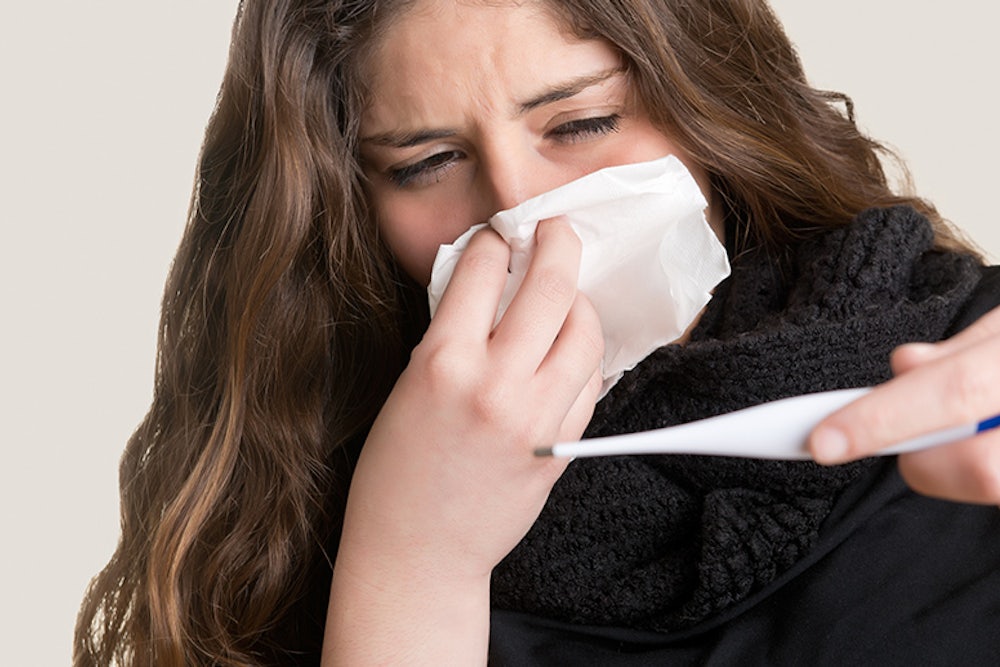Congress can’t seem to enact anything of substance and, thanks to House Republicans, it certainly isn’t about to ratify any Democratic initiatives. But state and local governments, where liberals have more sway, are pretty busy these days. New York City is introducing a program that will make preschool available to all children. Seattle, among others, has raised its minimum wage.
Now California lawmakers are on the verge of passing another progressive piece of legislation—one that would make life easier for stressed out workers and maybe slow the spread of disease, all while providing national Democrats with an idea that they could incorporate into their 2016 campaign agenda.
The bill, A.B. 1522, is called the “Healthy Families, Healthy Workplaces Act of 2014.” Its purpose? To guarantee that all people who work in California can take up to three sick days a year, with pay, above and beyond any vacation time. The logic is straightforward. If people don’t get paid when they call in sick, they’re much more likely to show up. They’ll be less productive and take longer to recover, while spreading germs to co-workers who, if they get sick, will end up in the exact same situation.
Lots of people have paid sick days already, of course. But plenty don’t. A new study from the Institute for Women’s Policy Research suggests that 44 percent of workers in California don’t have access to even one paid sick day a year. As you might expect, the availability of sick days correlates strongly with education level. If you have a cushy job or work for a generous hi-tech company, then your boss will probably pay you even for days when you call in sick. But if you’re in a low-paying profession? Then you probably don’t. Here’s the data:
Note that, of the three occupations with the least access to paid sick days, one is “personal care and service” while another is “food preparation and serving related”—just the people you want sneezing and coughing on the job. This situation isn't just bad for the customers. It's bad for the businesses that depend upon them, as a report from the National Partnership for Women and Families explains:
In the restaurant industry, nearly two-thirds of servers and cooks report that they have served or cooked while ill. Sick workers can create serious public health risks and lead to high costs. When a food service worker at a Chipotle restaurant in Kent, Ohio, came to work with a stomach virus because he had no paid sick days, he infected 500 people who became violently ill. The incident cost customers and the community hundreds of thousands of dollars — and caused reputational harm to the restaurant.
This is the fourth time that California lawmakers have taken up paid sick leave, as George Lauer reports for California Healthline, The first three efforts didn’t get very far. This one did, partly thanks to a strong push from the unions and partly thanks to the efforts of its sponsor, Assembly Member Lorena Gonzalez, Democrat from San Diego. She surprised (and disappointed) many allies by introducing a bill that guarantees just three paid sick days a year, rather than five or seven. But that compromise may have helped propel this measure farther than previous ones got.
Not that the opposition has gone away completely. Business groups worry it will add to their administrative burden, as so many regulations do. And there’s always the danger that companies figure out ways to rearrange other policies in order to avoid compliance—strategies that can end up hurting workers in the long run. But several cities, along with the state of Connecticut, have enacted paid sick day laws without causing major problems or disruptions, according to a report by the Center for Economic and Policy Research.
And the California Chamber of Commerce, which had called the bill a “job killer,” has indicated that it will remove that label thanks to some last minute amendments that will let companies with existing sick day policies keep them in place. (The legislature is still debating the issue and I’m not up on all the details, so this is subject to change.) If the State Senate passes it this week, as many expect it will, then the Assembly, which passed a version back in May, will likely ratify the amended version and send it to Governor Jerry Brown, who has signaled that he will sign it.
Whatever happens to this measure, it won’t be the last we hear about this issue. New Jersey is contemplating a similar measure. High-profile national Democrats, including House Speaker Nancy Pelosi, Representative Rosa DeLauro, and Senate HELP Committee Chairman Tom Harkin have also championed this cause. As they note, the rationale for federal legislation is as strong as it is for the California initiative. According to the National Partnership, 40 million workers nationally have no access to paid sick leave.
There isn’t much that Pelosi and the other congressional Democrats can do about this right now. But Hillary Clinton, or whoever leads the Democratic Party ticket in 2016, might eventually get a shot.
Image via Shutterstock

